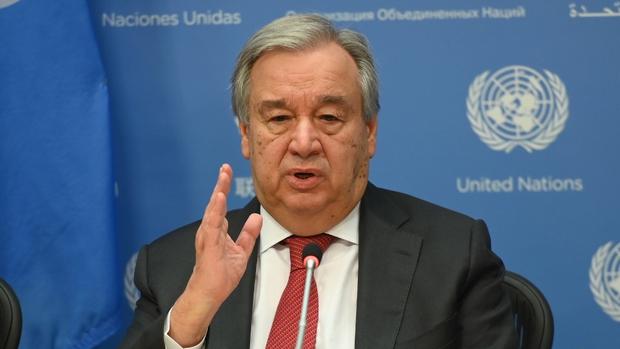 In this file photo United Nations Secretary General Antonio Guterres speaks during a press briefing at United Nations Headquarters on Feb 4, 2020 in New York City. (ANGELA WEISS / AFP)
In this file photo United Nations Secretary General Antonio Guterres speaks during a press briefing at United Nations Headquarters on Feb 4, 2020 in New York City. (ANGELA WEISS / AFP)
NEW YORK - United Nations Secretary-General Antonio Guterres has proposed new envoys to mediate conflicts in Libya and the Middle East, who could be given the greenlight by the UN Security Council on Tuesday after months of delay, diplomats said.
Guterres put forward his current Middle East envoy Nickolay Mladenov to become his Libya special envoy - replacing Ghassan Salame who stepped down in March due to stress - and named veteran Norwegian diplomat Tor Wennesland to succeed Mladenov as the UN mediator between Israel and the Palestinians.
If there are no objections by any of the 15 Security Council members by Tuesday evening then the appointments will be approved, ending months of bickering sparked by a US push to split the Libya role to have one person running the UN political mission and another focused on conflict mediation.
If there are no objections by any of the 15 Security Council members by Tuesday evening then the appointments will be approved, ending months of bickering sparked by a US push to split the Libya role to have one person running the UN political mission and another focused on conflict mediation
ALSO READ: UN welcomes Libya's appointment of women judges
The Security Council agreed to that proposal in September. Guterres then proposed Bulgarian diplomat Mladenov for the Libya role last month and on Friday named Wennesland, currently Norway’s special envoy on the Middle East peace process, to replace Mladenov, according to letters seen by Reuters.
Mladenov has been the UN Middle East envoy since 2015.
Libya descended into chaos after the NATO-backed overthrow of leader Muammar Gaddafi in 2011. In October, the two major sides in the country’s war - the internationally recognized Government of National Accord (GNA) and Khalifa Haftar’s eastern-based Libyan National Army (LNA) - agreed a ceasefire.
READ MORE: UN: Libya talks reach election breakthrough
Haftar is supported by the United Arab Emirates, Egypt and Russia, while the government is backed by Turkey.
In the Middle East, the Palestinians want to establish a state in the West Bank, east Jerusalem and the Gaza Strip, territories Israel captured in the 1967 Middle East war.


